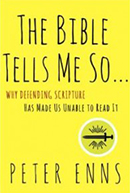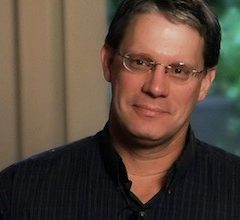
A battle over the Bible always seems to be brewing among Christians. But one scholar has a new message: stop trying to defend it! – Photo courtesy of Eric Demarcq (http://bit.ly/1uwOvBi)
A battle over the Bible always seems to be brewing among Christians. From what the Bible is to what it says to how to interpret, they can’t seem to stop squabbling over the Scriptures. Peter Enns is on the front lines of this conversation with a new message: stop defending the Bible.
As a professor of Biblical studies at Eastern University with a PhD in Near Ancient Languages and Civilizations from Harvard University, Enns has done his homework, and he presents it in his newest book, The Bible Tells Me So: Why Defending Scripture Has Made Us Unable to Read It. Here, we discuss his thesis and how he responds to those who disagree.
DISCLAIMER: Readers will notice that I asked Enns to respond to Kevin DeYoung, whose book, Taking God at His Word: Why the Bible is Knowable, Necessary, and Enough, and What That Means for You and Me, situates him across the theological table from Enns. My desire was to create a dialogue in this forum where both men’s perspectives were presented as they responded to the other. DeYoung initially agreed to the interview (via his publicist at Crossway), and the questions were drafted accordingly. Upon discovering the other interviewee was Peter Enns, DeYoung said he was too busy to answer the six questions sent to him. Enns, however, completed the interview and his answers are included below.
RNS: Summarize for me what the Bible is and isn’t in a handful of words.
PE: The Bible is holy scripture, not because it achieves some standard of perfection driven by alien theological requirements, but because God in his wisdom—which is inscrutable and no one can question—has given the church a collection of diverse, ancient writings. These writings span as much as 2000 years, arise out of many different contexts, and address a multitude of diverse, concrete concerns of the time. This is the inspired text we have, and we respect it and God when we refrain from imposing upon it modern expectations of systematic coherence and historical accuracy.
[tweetable]The Bible isn’t like an owner’s manual or legal contract[/tweetable], where we follow clearly a set of rules and if we deviate from them we risk spiritual disaster. Neither is it a depository of historical or theological information that conforms to modern alien standards of “perfection,” accuracy, or consistency. I believe that perpetuating these expectations sells the Bible (and God) short, for it spends so much time scurrying about explaining why the Bible doesn’t seem to behave as we “know” it should—which suggests, ironically, that God is not a good communicator.
RNS: What is the biggest misconception about the Bible held by Christians who believe differently than you?
PE: The biggest misconception is in expecting of the Bible something it simply doesn’t deliver—or can only deliver through an ingenious array of “defenses” and “explanations.” These tactics are not intentionally deceptive or destructive, but are driven by fear of losing a hold on the only Bible they know, which then threatens their faith in God. The logic is that divine inspiration must necessarily yield an inerrant Bible, and so to speak of inaccuracies and contradictions is seen not only as an affront to God, but in some cases casts doubt on God’s very existence.
[tweetable]The Bible cannot bear the weight of inerrantist thinking.[/tweetable] Expecting it to is the true cause of disquiet and despair for those who have read the Bible and see the cracks in the inerrantist logic.
RNS: Kevin DeYoung has written a book essentially defending the Bible. Your book argues that defending the Bible has made us unable to read it. What is the crux of your disagreement?
PE: I haven’t read Kevin’s book, so I can’t comment on it directly. I am familiar, though, with Kevin’s understanding of the nature of Scripture and his defense of it from his blog. I would surmise that Kevin’s defense of scripture parallels that of others who agree with him. The crux of my disagreement with him would be that the Bible he is defending is not really the Bible so much as it is a defense of a particular brand of inerrantist dogmatic theology that I feel is foreign to the Bible.
Equating that theology with the Bible itself runs into well known problems, and thus leads to the steady stream of books, essays, and even whole encyclopedias offering “defenses” of the Bible. This is geared toward protecting a dogmatic theology and the Bible as some would like it to be, but it actually gets in the way of understanding the Bible we have.
RNS: Kevin says, “As the people of God, we believe the word of God can be trusted in every way to speak what is true, command what is right, and provide us with what is good.” What’s your reaction to that?
PE: The people of God are called upon to trust God first and foremost, and that is not the same thing as trusting the Bible. You’ll note how Kevin couples the two. Though the two are not divorced, of course, identifying them that closely threatens to locate true faith in proper exegesis of the biblical text, which I feel is a recurring problem. Such a claim is often used to out flank and render out of bounds any meaningful discussion of the pressing problems of scripture; for to raise the question of historical accuracy in the Bible is to distrust God.
Further, simply saying that the Bible must be “trusted” as “true…right…good” raises inevitable question: “Trusted,” yes, but trusted to do what? “True,” yes, but true in what way? I fear that Kevin would answer those questions by saying the Bible must be trusted to provide historically accurate information, trump science with respect to human origins, and maintain one constant point of view on theological matters—and with that we are back to the problem of false expectations.
And does scripture always command what is “right” and provide us with what is “good?” What exactly does that even mean? Especially in light of well known commands in the Bible that neither Jews nor Christians would normally consider right and good, such as stoning rebellious sons or adulteresses, beating slaves to death, and treating virgin women as property?
Kevin’s statement may appear to hold the Bible in high regard, but without pressing through the very details of scripture, is not an adequate guide for faithful biblical interpretation.
RNS: Kevin argues for the inerrancy of scripture saying, “The dual authorship of Scripture does not necessitate imperfection any more than the two natures of Christ means our Savior must have sinned.” Your thoughts?
PE: It is not entirely clear what Kevin means by “imperfections.” The argument he is mounting is common enough among inerrantists, and there is little question that he is thinking of things like historical inaccuracies, contradictions, theological contradictions, and immoral commands, as “imperfections.”
But to label them “imperfections” largely misses the whole point of the incarnational analogy. These are not imperfections, but properties of a Bible produced in real time and space, and thus no more imperfections than are the olive skin, bearded face, and sandaled feet of Jesus of Nazareth, the languages he knew, and his limited knowledge (like not knowing when the end would come, string theory, Bach, or French).
Christians believe that Jesus is more than human, but he is certainly not less than human either! As fully human, Jesus participated fully in his particular moment in history: first century Judea. The Bible can do no less: it fully bears the marks of its human, historical settings.
These marks are precisely what is so concerning to Kevin because he approaches his reading of scripture with a predetermined view of what a biblical imperfection is. He assumes that a “perfect” scripture would not have certain properties, which does little more than rule out of bounds those very properties the Bible displays, thus causing him to launch a “defense.” [tweetable]Strictly speaking, Kevin Deyoung’s view of “imperfections” is unbiblical.[/tweetable]
The very properties of scripture inerrantists find so troubling should in fact be celebrated and affirmed as very acts of God, who freely and lovingly steps into the human drama in contextually meaningful ways. These qualities can and should be expected and embraced as a theological positive, not a source of doctrinal worry.
Authors note: In the disclaimer above, the phrase “via his publicist at Crossway” was added as a parenthetical. Because it is possible that the Crossway publicist assumed he would be willing to do the interview and agreed to it on his behalf, this is noted above.







